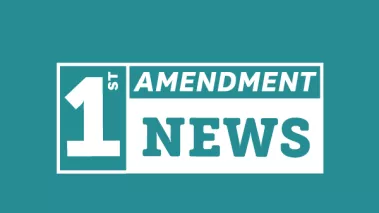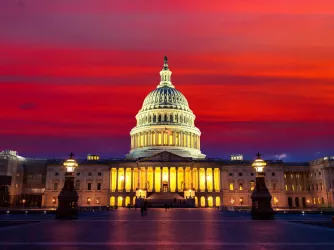Table of Contents
Special law review issue: New and forthcoming articles — First Amendment News 364

Sykes on free speech and academic freedom . . . and ‘terrible arguments’
- Emerson Sykes, “Free Speech, Academic Freedom, and Racial Justice on Campus: An ACLU Lawyer’s Perspective,” Hastings Race and Poverty Law Journal (2023)

The Stop W.O.K.E. Act includes eight prohibited concepts which are lifted directly from President Trump’s Executive Order 13950 that was blocked by a federal court because it was too vague. The Executive Order was also withdrawn by President Biden, but nonetheless, it’s gone on to live a thousand lives because it’s been cut and pasted into hundreds of policies and state bills around the country.
This list of eight so-called “divisive concepts” is interesting because some of them are seemingly innocuous. The first concept is that you’re not allowed to teach that one race or sex is inherently morally superior to another. No one was really teaching that to begin with, so banning it doesn’t really stifle anyone’s speech in particular, but it’s still kind of strange.
Some of the concepts are nonsensical. My favorite is there’s one that says that you’re not allowed to teach, that anyone “cannot or should not attempt to treat others without respect to race, sex, gender and national origin.” A judge —actually our judge — in Florida recently ruled that the same provision in the employment context, “achieved the rare triple negative.” So, some of these concepts on their face are ungrammatical and unconstitutionally vague.
There is another category of these concepts, though, that directly targets topics of public debate. For example, you’re not allowed to teach that meritocracy, objectivity, or colorblindness are racist or sexist concepts. Of course, people might not agree with the idea that colorblindness is racist, but I know that there are multiple professors in this very law school who believe and teach based on mountains of research and evidence that colorblindness can be racist. But in Florida, it’s a violation of the law to teach that colorblindness can be a racist concept, and that’s on penalty of termination, on penalty of individual lawsuits being filed against you through this law and on penalty of the withdrawal of state funding for your public institution of higher education.
Another banned concept is that you’re not allowed to teach that anyone has specific status or privilege based on their race or sex. So, you’re not allowed to teach the idea that there is such a thing as white privilege.
Journal of Free Speech Law (2023)
Symposium: Non-Governmental Restrictions on Free Speech
- Jane Bambauer, Ashutosh Bhagwat, and Eugene Volokh, Symposium Introduction: Non-Governmental Restrictions on Free Speech
Keynote Address
- Danielle Keats Citron, Intimate Privacy’s Protection Enables Free Speech
Panel on Non-Governmental Restrictions Generally
- Larry Alexander, Free Speech and Private Censors
- Thomas Healy, Social Sanctions on Speech
- Thomas Hochmann, Why Freedom of Expression Is Better Protected in Europe Than in the United States
- J.P. Messina, Public Calls for Censorship as Bad Speech
- Jeremy Waldron, Free Speech Apart from Law
Seana Shiffrin on government speech
- Seana Valentine Shiffrin, “Unfit to Print: Government Speech and the First Amendment,” UCLA Law Review (2022)
Schafer and Valsangikar on anti-SLAPP suits in federal court
- Matthew Schafer and Tanvi Valsangikar, “The Application of the New York Anti-SLAPP Scheme in Federal Court,” SSRN (Jan. 20)
In 2020, the New York Legislature amended the 1992 anti-SLAPP scheme. That scheme, meant to discourage strategic lawsuits against public participation (SLAPPs), had failed to serve its purposes. The 2020 amendments broadly expanded its scope and the strength of its protections. Yet, courts have adopted a cautious approach to the amendments, giving them a narrow compass in several cases. This Article discusses the most worrying result of this approach: courts’ reticence to apply the anti-SLAPP scheme in federal court. This issue has new urgency as Supreme Court justices call for overruling of certain federal free speech protections while politically motivated defamation lawsuits are on the rise. Indeed, in lieu of federal protections, state anti-SLAPPs are one of the few things standing in the way of thin-skinned litigants seeking retribution — not redress — in court.
This Article argues that most of the New York anti-SLAPP scheme applies in federal court, advancing an affirmative case and deconstructing contrary case law. Specifically, it concludes the law’s cause of action for damages and its modifications to the elements and burdens of a SLAPP plaintiff’s claims apply in federal court. As to the law’s seemingly procedural provisions, it concludes their application depends on how courts interpret Shady Grove Orthopedic Associates, P.A. v. Allstate Insurance Co. It also identifies the source of courts’ many analytical errors in this context, explaining how judges have fundamentally misunderstood the text, structure, and operation of the anti-SLAPP scheme by conflating it with other states’ anti-SLAPP laws. It concludes by calling on courts to go back to statutory and constitutional basics to determine the applicability of New York’s anti-SLAPP scheme.
Related
- Matthew Schafer and Jeff Kosseff, “The Most Important Supreme Court Precedent for Freedom of the Press Is in Jeopardy,” Slate (Jan. 22)
Wallace-Wolf on anonymous speech
- Jordan Wallace-Wolf, “Nobody’s Business: A Novel Theory of the Anonymous First Amendment,” Hastings Constitutional Law Quarterly (2022)

Namelessness is a double-edged sword. It can be a way of avoiding prejudice and focusing attention on one’s ideas, but it can also be a license to defame and misinform. These points have been widely discussed. Still, the breadth of these discussions has left some of the depths unplumbed, because rarely is the question explicitly faced: what is the normative significance of namelessness itself, as opposed to its effects under different conditions? My answer is that anonymity is an evasion of responsibility for one’s conduct. Persons should ordinarily be held responsible for what they do, but in some cases, where there is sufficient justification, they may enjoy a privilege not to be. One such privilege — the privilege to participate in community thinking — is based in the First Amendment interest that persons have in developing their thinking with others without having to be held responsible for it.
I argue that this privilege was not applicable eleven years ago to the challengers in Doe v. Reed and is, for somewhat similar reasons, not applicable to the challengers in the Supreme Court’s most recent anonymity case: Americans for Prosperity Foundation v. Bonta. I argue it was wrongly decided.
Shearer on banning books
- Marisa Shearer, “Banning Books or Banning BIPOC?,” Northwestern University Law Review Online (2022)

Following the murder of George Floyd in May 2020, social justice movements renewed calls for the country to confront the pervasive reality of systemic racism in the United States. In response to these publicized social justice movements, however, calls for book bans relating to critical race theory began rising at an unprecedented rate. Although book ban censorship is not novel, the recent shift in focus to remove critical race theory from public school libraries marks a new era of content-based censorship.
This Essay examines why current book bans targeting critical race theory are content-based restrictions that necessarily violate the First Amendment. It explores the social and legal history of book bans in the United States and discusses recent trends in book ban censorship. This Essay then identifies First Amendment ‘areas of non-protection through which book ban proponents seek to exclude race-related content and analyzes why all are pretextual fallacies that undermine freedom of speech principles and mandate diversity in the judiciary.
Abel on the regulation of police social media speech
- Jonathan Abel, “Cop-‘Like’ (‘👍’) The First Amendment, Criminal Procedure, and the Regulation of Police Social Media Speech,” Stanford Law Review (2022)

What happens when a law enforcement officer makes an offensive comment on social media? Increasingly, police departments, prosecutors, courts, and the public have been confronted with the legal and normative questions resulting from officers’ racist, sexist, and violent social media comments. On one side are calls for severe discipline and termination. On the other are demands that officers be permitted to express their views without fear of retaliation. The regulation of police social media speech has been largely conceived of in First Amendment terms. But because an officer’s comments affect her ability to testify, criminal procedure is also employed in regulating this speech. This Article fuses First Amendment and criminal-procedure doctrines to shed light on the problem of, and potential solutions for, the regulation of social media speech by officers.
This Article makes three core contributions. First, it describes the tensions between the First Amendment and criminal-procedure paradigms for regulating police social media speech. Second, it defines the challenges posed by pseudonymous, private, and otherwise ‘hidden’ speech, which the criminal-procedure paradigm, but not the First Amendment one, is equipped to address. And third, this Article argues that police departments and prosecutors must proactively monitor their officers’ social media speech or risk undermining defendants’ criminal-procedure rights, the public’s faith in the legitimacy of the police force, and even the speech rights of police officers themselves.
Shanor and Light on First Amendment and science, politics, and markets
- Amanda Shanor and Sarah E. Light, “Greenwashing and the First Amendment,” Columbia Law Review (2022)

Recent explosive growth in environmental and climate-related marketing claims by business firms has raised concerns about the truthfulness of these claims. Critics argue (or at least question whether) such claims constitute greenwashing, which refers to a set of deceptive marketing practices in which an entity publicly misrepresents or exaggerates the positive environmental impact of a product, a service, or the entity itself. The extent to which greenwashing can be regulated consistent with the First Amendment raises thorny doctrinal questions that have bedeviled both courts and scholars. The answers to these questions have implications far beyond environmental marketing claims.
This Essay is the first to offer both doctrinal clarity and a normative approach to understanding how the First Amendment should tackle issues at the nexus of science, politics, and markets. It contends that the analysis should be driven by the normative values underlying the protection of speech under the First Amendment in the disparate doctrines that govern these three arenas. When listeners are epistemically dependent for information on commercial speakers, regulation of such speech for truthfulness is consistent with the First Amendment and subject to the laxer review of the commercial speech doctrine. This is because citizens must have accurate information not only to knowledgeably participate at the ballot box but also to have meaningful freedom in economic life itself.
Gov. DeSantis violated the First Amendment . . . but no relief?
- Herb Scribner, “DeSantis violated First Amendment by removing elected official, judge rules,” Axios (Jan. 21)

U.S. District Judge Robert Hinkle wrote in his ruling that evidence showed DeSantis punished [Hillsborough County State Attorney Andrew] Warren for his political leanings and that doing so violated Warren's free speech rights.
- He said the governor suspended Warren ‘ostensibly on the ground that Mr. Warren had blanket policies not to prosecute certain kinds of cases. The allegation was false,’ Hinkle wrote.
- ‘Mr. Warren’s well-established policy, followed in every case by every prosecutor in the office, was to exercise prosecutorial discretion at every stage of every case.’
Yes, but: Hinkle said federal law does not allow the elected prosecutor Warren to immediately return to office despite the violations.
So might the ousted state attorney do next?
Over at the Tampa Bay Times, Sue Carlton reports:
“This is not over,” Warren said Friday at the end of a brief news conference.
Though he didn’t take questions or talk about what that next move might be, here are some of his legal options.
Warren could appeal to the U.S. Court of Appeals for the 11th Circuit in Atlanta. Even before Hinkle’s ruling, legal experts predicted that whoever was on the losing side would take their case to Atlanta.
They could also take the matter directly to the Florida Supreme Court with what’s called a writ of “quo warranto’ motion — Latin for ‘by what warrant or authority.”
YouTube: Defamation lawsuit against Beto O’Rourke
- “This Lawsuit Could OBLITERATE Free Speech, Beto O’Rourke SUED For Exposing Billionaire’s ‘Donations’,” TYT /YouTube (Jan. 21)

News outlets oppose gag order in Idaho murder case
- Rebecca Bone, “News outlets join to oppose gag order in Idaho stabbing case,” Associated Press (Jan. 23)
Twenty-two regional and national news organizations have formed a coalition to ask a judge to narrow a gag order in the case against a man accused of killing four University of Idaho students.
The coalition, which includes The Associated Press, contends that press access to law enforcement officers and other officials involved in high-stakes criminal cases provides the public with important context and a better understanding of how the criminal justice system operates.
[ . . . ]
“This order is unnecessarily sweeping and broad and severely impedes the public’s understanding of a significant criminal investigation that profoundly impacted the community,” said Josh Hoffner, national news director for The Associated Press.
Harvard’s Kennedy School relents — Roth gets fellowship
- Jessie Appleby, “VICTORY: Harvard dean relents, will offer fellowship to human rights leader,” FIRE (Jan. 20)

Two weeks after The Nation first reported that the dean of Harvard’s Kennedy School was blocking a fellowship offer to the former head of Human Rights Watch Ken Roth — purportedly due to Roth’s criticism of Israel — the dean, Douglas Elmendorf, announced he changed his mind and that the initial decision was an “error.” In recent days, the controversy over that decision played out on Twitter and newspaper op-ed pages, prompted a letter from FIRE about academic freedom, and generated protests from hundreds of Kennedy School affiliates.
Roth led Human Rights Watch for nearly 30 years until he announced his retirement last April. Sushma Raman, executive director of the Kennedy School’s Carr Center for Human Rights Policy at the Kennedy School, reportedly approached Roth about joining the Center as a senior fellow. Roth had participated in events and debates at the Center since its founding, and the Center had hosted scholars in similar positions in the past, such as Amnesty International’s former executive director William Schultz and secretary general Salil Shetty.
Knight First Amendment Institute’s podcast series
“Views on First” begins with arguably the most famous Twitter handle of all — @realdonaldtrump — and the Knight Institute’s groundbreaking lawsuit establishing that the First Amendment bars public officials from blocking critics from their social media accounts. Over the course of five episodes, host Evelyn Douek — legal scholar and a self-described content-moderation nerd — talks to guests from the tech industry, legal practice, and academia about some of the thorniest questions that arise when social media collides with the First Amendment.
The five-episode series starts on January 18, 2023, with new episodes posted on Wednesdays. Subscribe wherever you get podcasts.
More in the news
- Aaron Sibarium, “Yale Law School Bars Press From Free Speech Panel. Yes, Really,” The Washington Free Beacon (Jan. 24)
- Stuart Brotman, “Create a climate change for media misinformation,” NJ Spotlight News (Jan. 24)
- Aurora Bosotti, “Louisiana AG rages at White House for First Amendment breach over social media pressure op,” Express (Jan. 24)
- Eugene Volokh, “The First Amendment and Sexual Orientation ‘Conversion Therapy’—Next Stop, the Supreme Court?,” The Volokh Conspiracy (Jan. 23)
- Adam Liptak, “Supreme Court Puts Off Considering State Laws Curbing Internet Platforms,” The New York Times (Jan. 23)
- George Leef, “School Officials Are Slow Learners on Faculty Free-Speech Rights,” National Review (Jan. 23)
- Jonathan Adler, “MIT's Free Speech Problem,” The Volokh Conspiracy (Jan. 23)
- Alanna Durkin Richer and Lindsay Whitehurst, “The seditious-conspiracy charges in Jan. 6 trial,” Associated Press (Jan. 20)
- Jeff Cieslikowski and Sean Stevens, “Emotional intelligence, cognitive ability may predict support for free speech,” FIRE (Jan. 20)
2022-2023 SCOTUS term: Free expression and related cases
- 303 Creative LLC v. Elenis (argued Dec. 5)
- Jack Daniel’s Properties, Inc. v. VIP Products LLC
- United States v. Hansen
- Counterman v. Colorado
Pending petitions
- Price v. Garland
- Moore v. Texas
- Barton v. Texas
- Arkansas Times v. Waldrip
- Moody v. NetChoice, LLC
- NetChoice, LLC v. Moody
- Florida v. NetChoice
- Novak v. City of Parma
- Klein v. Oregon Bureau of Labor and Industries
State action
Qualified immunity
Immunity under Foreign Sovereign Immunities Act
- NSO Group Technologies Limited v. WhatsApp Inc. (cert. denied)
Liability Anti-Terrorism Act
- Twitter v. Taamneh (argument Feb. 22)
Section 230 immunity
- Gonzalez v. Google (argument Feb. 21)
Review denied
- My Pillow v. U.S. Dominion (news story)
- Kowall v. Benson
- Tofsrud v. Spokane Police Department
- Swanson v. Griffin County
Last FAN
This article is part of First Amendment News, an editorially independent publication edited by professor Ronald K. L. Collins and hosted by FIRE as part of our mission to educate the public about First Amendment issues. The opinions expressed are those of the article's author(s) and may not reflect the opinions of FIRE or of professor Collins.
Recent Articles
FIRE’s award-winning Newsdesk covers the free speech news you need to stay informed.

One day after FIRE lawsuit, Congress passes changes to filming permits in national parks

VICTORY: FIRE lawsuit leads California to halt law penalizing reporters, advocates, and victims who discuss publicly known information about sealed arrest records

O holy fight: New Hampshire Satanic Temple statue threatened by more than vandals


